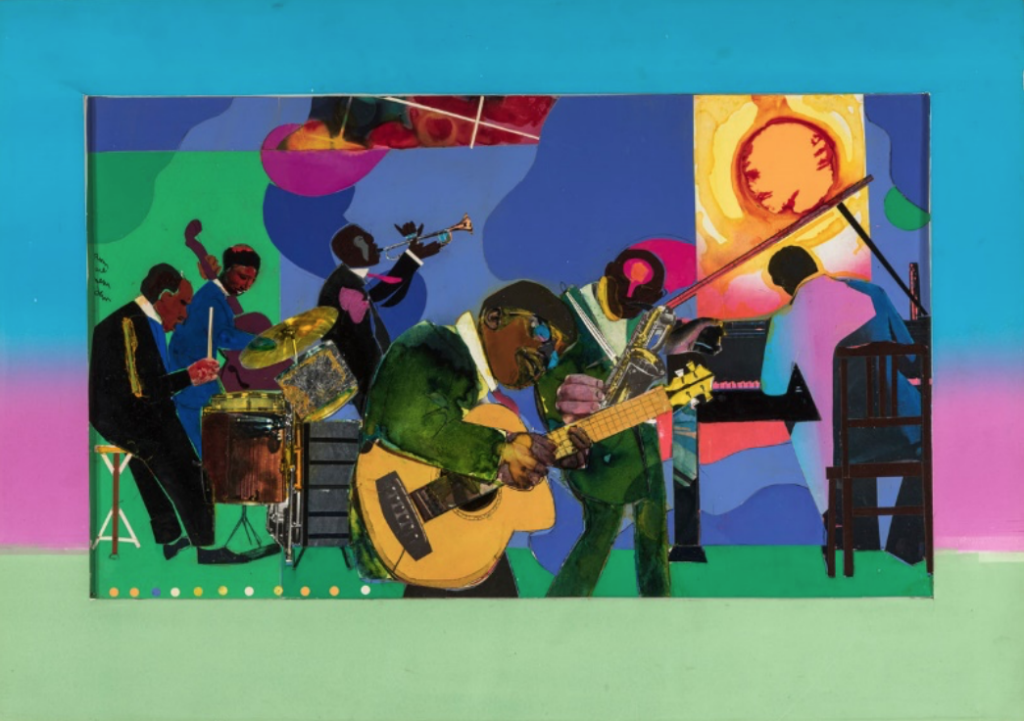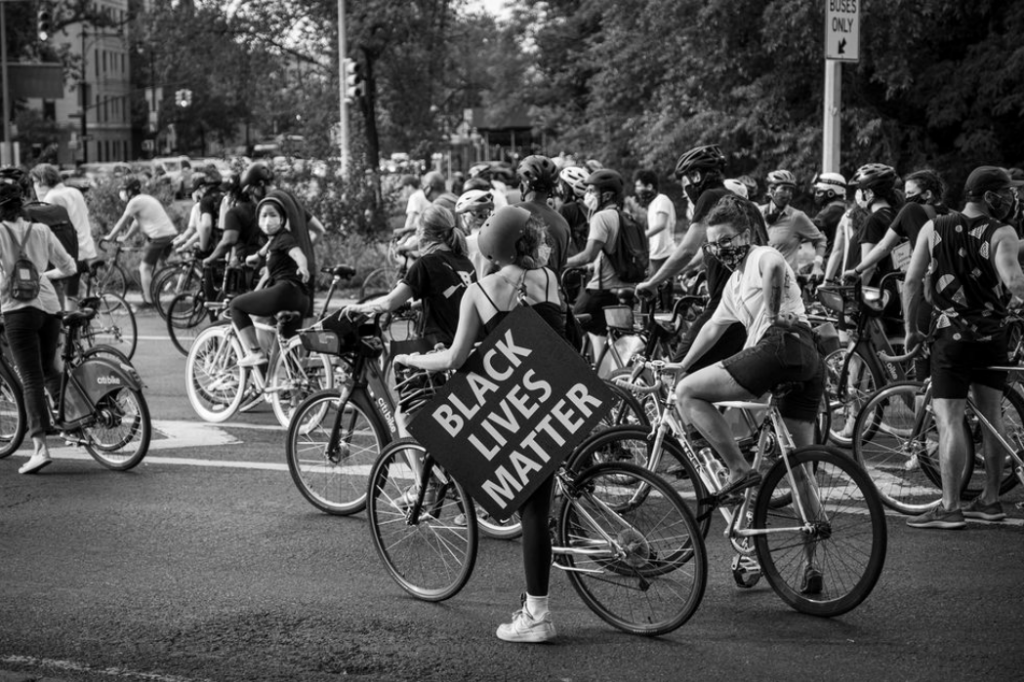Jazz Explorations
Winter 2023 – Kalamazoo College
MUSC165
Dr. Beau Bothwell
Email: beau.bothwell@kzoo.edu
Class: MWF 9:40-10:55am
Fine Arts Room 11
Office Hours: M 11am-12pm, T 10-11am,
or by appointment.
Office: Fine Arts 128

Romare Bearden, Jammin’ at the Savoy (1981-82)
Description:
This course is intended to introduce students to the cultural context, instrumentation, theory, form, and analysis of jazz from its early West African roots to contemporary times. Emphasis will be placed on listening to various artists and styles. No music reading or basic theory knowledge is required.
The primary objectives of this course are to:
- Increase your knowledge and enjoyment of jazz and related musics both as historical and cultural phenomena and as vehicles for creative expression
- Develop the skills necessary to become an active and perceptive listener
- Experience the joys (and frustrations) of creating music that incorporates improvisation
- Explore and understand the social and historical influences on the development of jazz and related creative musics
Assignments and Evaluation:
Students will be evaluated according to the following criteria
| Assignments | Value |
|---|---|
| Attendance and Participation | 9 |
| Daily Pre-Class Reading/Listening Qs | 15 |
| Concert Attendance (2) | 5 |
| Trio Performance Assignments | 20 |
| Midterm Exam | 18 |
| Final Exam | 33 |
Required Reading and Listening:
For the first half of the course, we will be drawing extensively from Ted Gioia’s The History of Jazz. I highly encourage you to purchase a physical copy for reference and to use in class. Used copies of the first edition (New York: Oxford University Press, 1998) are available online for less than $10. The book is also available online via the Kalamazoo College library. Additional readings will be posted on the course website.
Preparation and Daily Assignments:
I will post a will be a brief set of questions online about aspects of the reading and listening assignments, and your submissions is due each day before class. (Access to the daily questions will require your K login.) Additionally, the course will include a significant amount of discussion, and students should come to class ready to discuss and ask questions about daily reading and listening assignments.
Maximum Possible Points on Daily Questions:
| Daily Questions… | Points |
|---|---|
| Completed before class | 11/10 |
| Completed before the subsequent class | 8.5/10 |
| Completed any time after the subsequent class | 7/10 |
Course Website
All reading and listening assignments will be posted on the course website.This is the site you should be checking frequently.
password: changes
Moodle will be used exclusively to post grades.
Performance Trio Projects
You will form a jazz trio with fellow class members and perform the following in class:
- Rhythm Band Project (Week 3)
- Melodic Improvisation Project (Week 5)
- 12-Bar Blues Project (Week 9)
- American Songbook Standard project (Week 10)
I will describe each of these in detail over the coming weeks, but in brief: Your composition projects must include improvisation by each partner and utilize several of the jazz techniques discussed in class. (E.g., call & response, pitch bends, timbral variation, scat singing, stop-time, double-time, solo breaks, trading twos, fours, eights, etc. More to follow.)
- Due at Final Exam time a two-page Reflection Summary of your performance projects detailing the learning experience/process. This is not graded, however, failure to submit this assignment will automatically lower your final grade by ½ letter grade
Required Music Streaming Service
This semester, we will primarily be using Spotify and Youtube as our music portals, supplemented by online databases accessed through your Kalamazoo login, as well as a variety of online resources. All students should sign up for a (free) Spotify account.
A note about studying for a listening-intensive course
There will be extensive listening portions on both the midterm and the final. Please keep in mind that it is impossible to cram aural information the way you cram visual information. No matter how hard you might be studying, it still takes over an hour to listen to Duke Ellington’s Far East Suite from beginning to end. Don’t wait until the last minute to try to familiarize yourself with the listening.
Class Participation
Participation will be evaluated on the following criteria:
A: You contribute to class frequently (almost every session, though I don’t expect everyone to be “on” every day). Your comments reflect excellent preparation, build from the comments of others and/or offer direction for the discussion. If you were not in the class, the quality of discussion would be diminished markedly.
B: You contribute to class sometimes. Your comments reflect good preparation, sometimes build from the comments of others and/or sometimes offer direction for the discussion. If you were not in the class, the quality of discussion would be diminished.
C: You contribute to class rarely. Your comments reflect adequate preparation, occasionally build from the comments of others and/or occasionally offer direction for the discussion. If you were not in the class, the quality of discussion would be diminished somewhat.
D: You contribute to class very rarely or not at all. As a result, there is little or no basis for evaluation. If you were not in the class, the discussion would not be changed.
Also D: You contribute to class but your contributions reflect inadequate preparation and offer no direction for the discussion. If you were not in the class, the discussion would be improved
Attendance Policy
Students are expected to attend every class session. In the event that you must miss a class due to religious observance, illness, family emergency, etc…, please provide notification as soon as possible, preferably in advance of the absence. After two unexcused absences, each subsequent absence will result in a 4% reduction in total course grade.
Statement on Academic Integrity
Acts of academic dishonesty are prohibited. Cheating includes, but is not limited to: (1) use of any unauthorized assistance in taking quizzes, tests, or examinations; (2) use of sources beyond those authorized by the instructor in writing papers, preparing reports, solving problems; or carrying out other assignments; (3) the acquisition, without permission, of tests or other academic material belonging to a member of the College community; (4) engaging in any behavior specifically prohibited by a faculty member in the course syllabus or class discussion. If you have any questions about these policies, please ask, and refer to the guidelines here.
Statement on Learning Difference
Any student with a learning difference who needs an accommodation or other assistance in this course should make an appointment to speak with me as soon as possible. Please do feel free to reach out as soon as possible.
An Important Tip for The Rest of Your Life
Whenever you send an assignment to a professor, a resume to a potential employer, or a request to a new contact, you should assume that this person receives dozens (or hundreds) of files as attachments every week. As such, it is in your interest to title your file in such a way that it is easy to track and identify at a glance. Using very specific filenames will also make your life much easier down the road when you are trying to find an old file.
Good Filename: MyName__Week1Response_Sept2022.doc
Bad Filename: Assignment1.doc
Good Filename: MyName_NewOrleansBoucePaper_10Oct22.pdf
Awful Filename: NewOrleans.pdf
Good Filename: MyNameResume_PositionTitle-CompanyName_2Nov24.prf
No Good, Terrible Filename: Resume.pdf
If you send me a filename similar to the bad examples above, you will receive a reply email consisting entirely of “what.huh?”
St. Louis Cluster Information
In January of 2022, Kalamazoo College received a three-year Mellon grant (For information about the grant, see Humanities Grant Boosts Experiential Learning Project.) Entitled Humanities Integrated Locational Learning (HILL), this initiative examines how many problems of our time can be analyzed through the lens of location and dislocation. To develop a deeper knowledge of these disruptions (physical, psychological, social, linguistic, and more) with the aim of generating the potential for change, HILL supports the formation of class clusters linked to specific places within and beyond Kalamazoo. Our course contributes to a “Beyond Kalamazoo” Cluster focused on St. Louis, comprised of the following winter courses: ENGL230 – U.S. Ethnic Literature (Dr. McDade); JAPN301 – High Intermediate Japanese (Dr. Sugimori); HIST215 – Victorianizing America (Dr. Boyer Lewis); SEMN201 Beauty Across Cultures (Dr. Zhang); MUSC165 – Jazz Explorations (Dr. Bothwell.)
While these courses will function independently, they are united by their engagement with St. Louis as a historical and contemporary site, as well as the way they draw from humanistic inquiry to construct justice-based notions of land, place, and belonging in response to humanistic concerns and social inequities (i.e., systemic racism, body and border policing, economic inequity, global warming, etc.)
After the conclusion of the quarter, cluster faculty and selected students will extend the classroom to St. Louis for a 7-day, fully-funded study away experience (includes travel, housing, and meals). During this partial-unit experiential social justice research seminar in St. Louis (June 5-12, 2023), 2-5 students from each cluster course will undertake individual and collaborative research within and across the disciplinary knowledges acquired in their respective courses in order to produce a supradisciplinary research project. The trip will prioritize place-based learning, humanities-based inquiry, and social justice problem-solving via relevant site visits, partnerships with local community organizations, and student-led discussion and reflection. At the end of the trip, students will publish their research on a digital humanities website.
Note: The partial unit will be credited in the summer, appearing on the Fall 2023 transcript.
Application process: Interested students will need to submit an application and a research proposal to the HILL site by Tuesday of 9th Week Feb. 28th. In the application, students will be asked to submit a <1000-word proposal that addresses the following questions:
- What are your general areas of research interest? Feel free to highlight subject matters, themes, texts, etc. from your cluster course for support.
- How does St. Louis’ “placeness” (history, geography/landscape, culture, etc.) pertain to your research interest? How do you see the theme of “location and dislocation” at work?
- How do your research interests connect to relevant social justice concerns?
- Have you had any experiences that may have prepared you for this experiential research seminar? Please detail any past research (individual or collaborative), service-learning courses, and/or experiential learning engagement you identify as relevant.
Applications will be reviewed by cluster faculty in conjunction with the Center for International Programs. Participants will be chosen based on potential collaborative research intersections across cluster courses and the importance of St. Louis as a site. Those selected for the experiential research seminar in St. Louis will be notified no later than 10th Week Friday (10 March 2023.)
Selection for the St. Louis Cluster Seminar will require the following mandatory commitments:
- Additional preparatory work throughout weeks 5-10 of the Spring term to prepare you for site engagements in St. Louis. You will be provided with a seminar syllabus in the Spring after cohort selection is finalized.
- Weekly meetings with your research group (held weeks 5-10 in the Spring on Mondays during common time, Hicks Banquet Hall West)
- Attend information sessions with community partners
- Meetings with the HILL Digital Humanities Coordinator, Bruce Mills
- Submission of pre-departure materials, week 10 Spring
- Write and submit a group project research proposal
- Individual or group seminar experiential reflection blog, video, interview due (TBA following St. Louis seminar.)
- Research project, due (DATES TBD, Summer) , with revision and approval in consultation with cluster faculty and DH Coordinator finalized (DATES TBA, Summer)
Additionally, a $4,500 summer research stipend for June-August 2024 is open to all students, with priority given to students who want to return to St. Louis after the cluster trip or students who participated in one of the St. Louis cluster courses in 2023. More information is available on our website.











